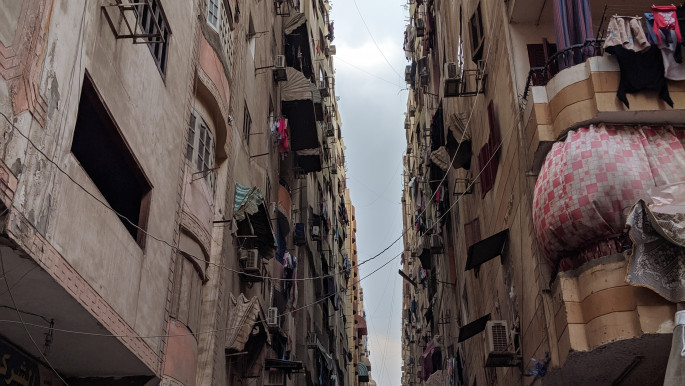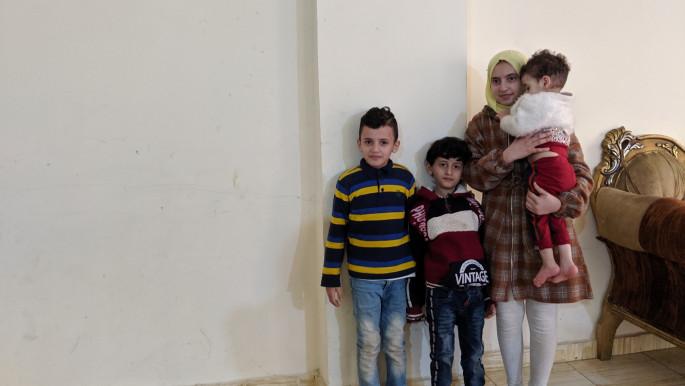Exiled in Egypt: Yemeni medical travellers stranded by war dream of home
There was no help for Maha and her family in Yemen. Three of her children suffered from rare genetic diseases that could quickly turn deadly without constant monitoring and treatment.
With no doctor who understood the conditions, a blockade on medicines and supplies, and with bombing terrorising the residents of Hodeida, Maha cared for her children alone, transforming their bedroom into a small clinic cluttered with IVs, bags of fluids, bottles of pills and smuggled powders which she mixed herself.
"I am alone, all alone. No doctor, no nurses, in war conditions with bombing everywhere, with [my children having] panic attacks with every bomb," she told The New Arab, describing the family's last years in Yemen. "This is not a life."
In June 2019, Maha and her children joined thousands of Yemenis fleeing to Egypt for medical care.
"Everyone here I know from Yemen came for treatment!" Maha told The New Arab, as she walked through a narrow street to her apartment in Cairo. She listed off cases of friends and relatives receiving care, as she stopped the elevator early to deliver food to a sick friend on the floor below.
Those who came are the lucky ones. With Yemen's healthcare system teetering on the brink of collapse, staying home can be a death sentence. Last year, the World Health Organization (WHO) estimated there were 35,000 cancer patients in the country, many of whom would die from lack of treatment.
 |
As the war in Yemen stretches into its sixth year return has become increasingly untenable, leaving many Yemenis stuck in Egypt for years, whether by choice or necessity |  |
It's not the first time Maha, 36, has sought care for her children abroad. Fifteen years ago, when her first baby began showing the alarming symptoms of what would eventually be diagnosed as Bartter's syndrome (BS), she brought her to Cairo for diagnosis. And she came again several years later, now with a second daughter suffering from glycogen storage disease.
But this time everything is different. This time she's not going home.
Seeking treatment in Egypt is nothing new. Yet as the war in Yemen stretches into its sixth year, return has become increasingly untenable leaving many Yemenis stuck in Egypt for years, whether by choice or necessity.
Meanwhile, they face mounting financial difficulty as savings run dry and support from relatives in Yemen dwindles. Finding work is difficult, especially for single parents.
 |
|
| Faisal, Giza, a crowded neighbourhood on Cairo's western side where many Yemenis live. [TNA/Tara Brian] |
No one knows exactly how many Yemenis are in the country, but NGOs estimate up to 1.6 million, based on an unofficial count by the Egyptian government.
The majority come explicitly for treatment, in part because this exempts them from visa requirements in place since the war broke out. Yemenia Airlines manager Khaled Alnomi estimates 80 percent of their passengers to Cairo travel for medical care, although some do still return to Yemen.
Despite expanding needs, community groups say the UN response has been slow. Paradoxically, Yemenis are almost categorically unable to receive refugee status in Egypt for reasons many believe are political.
"They say there are no problems with Yemenis: 'They are not refugees, everything is ok.' But there are a lot of problems here," says Qaboul Al-Absi, who last year helped form the Wojood Community which advocates for protection of Yemenis.
Some of the most desperate are those with medical needs.
"We have a lot of patients coming here, selling everything to come to Egypt… some of the refugees, they think when they come the UN can help them. When they arrive, they can't even get a place to stay," explains Samea Alwail, another member of Wojood.
One such woman is Noora, 40, who lives with her young daughter and baby son in a rooftop room in Cairo's crammed immigrant neighbourhood Faisal.
Read more: Yemen in Focus: Escalating violence undermines ceasefire effort
Noora is completely deaf following an explosion that rocked their family's home in Sanaa. After divorcing her husband, she sold everything she owned to come to Cairo because the cochlear implant she needs was not available in Yemen.
She approached the UN refugee agency but was told they could cover only a tiny fraction of the cost.
Deaf and with a baby, she cannot find work. The family survives month to month off small donations from people in the community and a winter stipend from the UN.
 |
When they know you're a Yemeni everything stops, I don't know why. Is our nationality a curse? |  |
Forty-three-year-old Nabila has also lost hope of receiving support for her medical problems. A teacher in Sanaa, she fled with her family to Cairo three years ago after being arrested by the Houthis for refusing to alter her curriculum. She soon developed severe haemorrhagic gastritis causing chronic bleeding and pain.
Despite repeated attempts to get care from UNHCR provider Caritas, she was refused.
Caring for four children and with her husband "as good as divorced", Nabila reached such financial strain that she married off her eldest daughter to get enough money to start a small business making Yemeni bread.
As for the Yemeni Embassy providing assistance, she only laughs. "If you don't take care of yourself, you will be a beggar on the street."
Stories like Noora's and Nabila's have spread through the Yemeni community in Egypt, discouraging many from registering with the UN at all.
Indeed, the number of registered asylum seekers is a small fraction of Yemenis in the country, at 9,160.
Ahmed Badawy, head of the Egyptian Foundation for Refugee Rights, believes the low registration rate causes a loop, whereby even fewer resources are allocated to Yemenis.
 |
|
| Three of Nabila's children pose for a picture holding their niece. [TNA/Tara Brian] |
"[When making funding decisions] the people [aid organisations] speak about the numbers, not about needs," he says.
His organisation encourages Yemenis to register. "If we have a big number, the UNHCR must make services," he explains. "The highest number in Egypt is Syrians…because of this the services are considerable…[Yemenis] are a smaller number but their needs are more."
Read more: Inside Arsheef, Yemen's first contemporary art gallery dedicated to emerging talent
One of the areas of greatest need is medical care. While most seek treatment in Egypt's sprawling public health system, which is free for Yemenis, medicine must be paid for by the patient and can become expensive.
The poorest turn to the UN.
UNHCR spokesperson Radwa Sharaf says all asylum seekers can access care through a network of partners. Yet for those with serious illnesses requiring long-term or specialist care this system is not always accessible or adequate, requiring case-by-case approval through a slow-moving process.
 |
This is not my destiny. I know somewhere else I'm going to have a normal life just like everyone else |  |
Part of the issue is funding. In 2019, UNHCR Egypt received less than half of its appeal of $104 million, putting pressure on essential programming.
The International Organization for Migration (IOM) offers free medical treatment for migrants not registered with UNHCR. Last year, noticing an increase in demand from Yemenis, they held several targeted workshops for the first time, and assisted more than 160 families with direct medical care.
At the same time, the agency expresses caution not to promote "medical tourism".
Read more: Yemen in Focus: Fifth war anniversary marks 'catastrophic abuses' on all sides
"The more you are helping people, the more word of mouth is spreading that IOM is giving free medical service. We don't want to end up encouraging migration you know," says Dr Asma Nadeem, head of the agency's health division.
Many others do not register with the UN because they don't consider staying in Egypt an option: they want to return to Yemen or move onwards.
Maha is used to figuring things out on her own. Today her children are all in stable condition, a testament to her determination and resourcefulness.
 |
|
| Read more: Saudi Arabia's faltering divide and rule strategy in Yemen |
She describes how for 13 years she has relied on an online community of other glycogen storage disease sufferers to learn how to care for her daughter who needs blood sugar tests and doses of corn-starch every four hours or her liver will swell and her body shut down.
After three years of trying, she finally got in touch with a specialist in the United Sates who has since helped over Skype and email.
She tells horrifying stories of bringing her children to hospitals in Yemen only for doctors to mis-administer treatment sending them into seizures, how when the electricity went off in Hodeida, her son—unable to regulate his electrolytes—nearly died from dehydration while she cared for him at home with an improvised IV.
As the situation deteriorated, she tried reaching out to anyone who would help.
"I contacted the United Nations, I emailed every single organisation, every single humanitarian organisation you have ever thought about…I contacted all the humanitarian personalities. You have no idea. Angelia Jolie," she said almost inaudibly and laughed, embarrassed. "No one helped. My message didn't reach anyone."
"When they know you're a Yemeni everything stops, I don't know why. Is our nationality a curse?"
Egypt, in comparison, is a pause, a respite from what she describes as an unimaginable situation. But for her, it is not a solution.
"I work all the time, but I never could cover all these expenses," she says, listing off the numerous pills, tests and specialised treatments her children need.
Meanwhile, her husband, a professor in Yemen who has been supporting her, is no longer receiving a salary.
Through bouts of depression, Maha maintains her faith. "This is not my destiny. I know somewhere else I'm going to have a normal life just like everyone else; my kids are going to be normal kids just like anyone else."
"Now I feel like I took the first step forward by getting to Cairo. But I know it's not going to be the end."
*Last names have been omitted for some of the women in this story to protect their privacy.
Tara Brian is a freelance journalist. She previously worked as a researcher with the United Nations' migration agency
Follow her on Twitter: @trbrian11





 Follow the Middle East's top stories in English at The New Arab on Google News
Follow the Middle East's top stories in English at The New Arab on Google News


